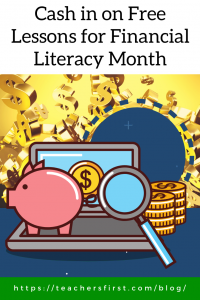“One reason why we need to teach financial literacy in school is to ensure that every child has equitable access to a fundamental life skill that is related to the financial outcomes of their lives.”
National Financial Educators Council
April is Financial Literacy Month, an opportunity for educators to focus on skills not taught in most schools. Most parents don’t teach financial literacy skills at home, either: this article in Forbes shares that 69% of parents are reluctant to broach finances with their children. The report states that only one in six high school students in the United States must take a semester-long course as part of their graduation requirements.
Because most schools don’t have a set financial literacy curriculum, it is often up to the individual teacher to find quality teaching materials. Another factor is finding the time to include these lessons within an already tight schedule.
One quality resource to consider is EVERFI (reviewed here). EVERFI offers free digital curricula covering a variety of topics, including financial literacy. Course materials are self-paced and accessible anywhere and on any device, making them perfect for use in remote and in-person learning situations. All content correlates to standards, including National Jump$tart Standards, 21st Century Skills, CASEL Competencies. Many courses are also available in Spanish.
EVERFI offers seven courses in financial literacy divided into grade-level bands that start with an option for late elementary-level students.
- Vault (grades 4-6) – Vault teaches basic financial literacy and decision making. Students participate in real-life scenarios based upon spending, saving, careers, and more. This course includes five digital lessons, taking approximately 20-25 minutes each.
- Future Smart (grades 6-8) – These lessons teach middle school students how to set goals, prepare for careers, and manage finances by participating in interactive, real-life scenarios. This course includes seven lessons with an approximate duration of 25 minutes each.
- Venture (grades 7-12) – This course introduces students to the concept of entrepreneurship by tasking students with creating a business plan to launch a food truck. Four lessons are each about 20 minutes long.
- Money Moves (grades 9-12) – Money Moves tackles the critical topic of handling finances using mobile and online tools. Using interactive experiences, this course guides students about making wise financial decisions, emphasizing the safe use of virtual payment applications. Successful completion of the course covers four lessons of approximately 15-20 minutes each.
- Pathways (grades 9-12) – Pathways’ activities help students learn about applying for student loans, the FAFSA process, and planning for loan repayment. This course includes five lessons that are 15 minutes each.
- Marketplaces (grades 9-12) – Discover the world of investments and financial markets with gamified learning experiences in this module. This course looks at the interactions between government, corporations, and individuals and how they combine to create financial markets. It includes five modules of 10-20 minutes each.
- EVERFI Financial Literacy (grades 9-12) – this comprehensive course provides an overview of financial literacy topics, including banking, budgeting, insurance, and much more. The interactive lessons assist students in understanding finances and developing strategies for managing finances. Included are seven lessons that each take approximately 35 minutes to complete.
Getting started with EVERFI is simple. Create your account, then follow the steps to add activities and classes. After creating an assignment, share the class code with students. Your teacher dashboard provides a report on student progress and scores. When browsing through courses, there are two options – Add or Request an activity.
If the course allows you to add it to your account, it will be available immediately. When Request is the only option, fill out the short form, and EVERFI’s representatives will add it for you. The site will give you one or the other of these options depending on the information in your profile. Of course, all lessons are still free.
If you need help getting started, this EVERFI basics video provides helpful tips to setting up an account and understanding what is available. For a walk-through on creating a class assignment, try this video.
Financial literacy is an important topic to teach to all students, and the younger students begin these lessons, the more prepared they are to make wise financial decisions. If you teach early elementary students, take a look at Money Smart Kids (reviewed here) to find introductory lessons. This site includes video lessons that teach young students the basics of earning, saving, spending, and donating money. Each video contains downloadable classroom activities.
As students complete activities and course modules, extend learning by asking students to share their financial expertise with their peers. Use the extensive tools found within Adobe Spark for Education (reviewed here) for students to create videos, graphics, web pages, and more to share financial concepts. For example, consider asking students to make a commercial for the food truck planned in the Venture model or have students design web pages featuring financial planning information for their chosen career.
As you think about Financial Literacy Month, keep in mind the importance of introducing financial information to your students. Find more options for free teaching resources here on TeachersFirst. As Frank A. Clark stated, “Many folks think they aren’t good at earning money when what they don’t know is how to use it.”
Do you have a favorite financial literacy lesson? What do you do to celebrate Financial Literacy Month? We always love to get tips and ideas from our readers and appreciate you sharing them in the comments below.


